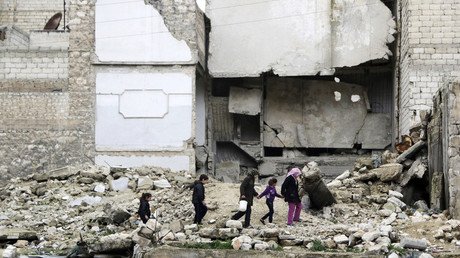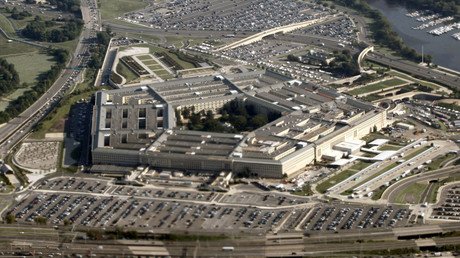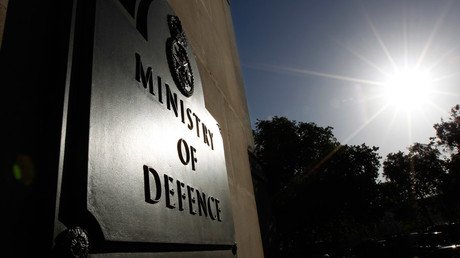Relentlessly critical: UK’s Hammond brands Russia a ‘challenge & threat,’ rejects cooperation
The British foreign secretary has rejected cooperation with Moscow until it “respects” the rules of the international system, to which Philip Hammond said Russia continues to pose a challenge and threat.
“Russia ignores the norms of international conduct and breaks the rules of the international system. That represents a challenge and a threat to all of us,” Hammond said during a two-day visit to Georgia. “There has to be a way that respects the rules of the international system if we are going to be able to do business together.”
The foreign secretary went on to say that it is time for Russia to play a “constructive” role on the world stage and follow the rules, accusing it of “aggression” in Ukraine, but he acknowledged the common goal between Britain and Russia of fighting Islamic State (IS, formerly ISIS/ISIL) in Syria and Iraq.
“I have no doubt that Russia is sincere in its desire to defeat Daesh [the Arabic name for IS] in Iraq and Syria,” Hammond told Reuters on Wednesday. “But we need to work together on these things and we can only work in partnership with countries which accept the international rules by which we all have to live. We can't be working in partnership with a country one day and find that it is doing just exactly whatever it wants.”
The latest criticism is not the first time Hammond has attacked Moscow and Russian President Vladimir Putin in particular. Earlier this month, he pointed the finger at Moscow for supposedly being the only country that wants Britain to leave the European Union.
“None of our allies wants us to leave the EU – not Australia, not New Zealand, not Canada, not the US. In fact, the only country, if the truth is told, that would like us to leave the EU is Russia. That should probably tell us all we need to know,” he said during a speech at the Chatham House think-tank.
The UK stance on Russia’s role in Syria seems strange, a number of experts have told RT, considering that even the Pentagon has acknowledged Russia’s “constructive role” in the Syrian peace process.
“It's clear that they have focused more of their military attention on ISIL. We think that is a good thing. We encourage that from the start,” Pentagon Press Secretary Peter Cook said during a briefing on Tuesday. “They're playing a constructive role with regard to the cessation of hostilities,” he added.
“It’s very interesting to see the increasingly different approaches towards Moscow, [from] Washington in comparison with London,” British Conservative MP Daniel Kawczynski told RT. “I’ve never known such a divergence between the two capitals in their approach towards Russia.”
Kawczynski acknowledged that Hammond “unfortunately” is “reflecting the general mood” of the Conservative party and the House of Commons, which views Russia in a “somewhat cautious way and are very fearful about Russian motives.”
At the same time, the MP said the Foreign Affairs Selective Committee understands the “importance of Anglo-Russian relations...[and] it is our responsibility to hold the government to account on foreign policy.”
Michael Raddie, co-editor of BSNews, told RT that not too many people in the UK view Hammond’s comments seriously.
“He hasn't made sense since he has been in the job. So either commenting against Russia or not commenting on Syrian and Arab bombing and Russian achievements in their campaign against terrorists within Syria – it does not surprise me at all,” Raddie said.
The UK does not side with Washington in its assessment of the Russian achievements in Syria, especially liberating Palmyra from the jihadists, because London ultimately continues to pursue regime change in Syria, Raddie believes.
“It is really deplorable that there has been no government spokesman from the UK at least praising the liberation of that historic town,” Raddie said. “I know that Phillip Hammond in particular and Michael Fallon [have] been relentlessly critical of Russia and in particular President Putin.”
For geopolitical reasons the UK “still has a plan of regime change in Syria,” to defend London’s financial interests in the region, which he says include building a natural gas pipelines from Qatar, across Syria into Turkey.
“They [UK politicians] do not care what the Syrian people want. They don’t care what the Syrian people have voted for. Their idea of democracy is that we will impose who they deem fit to run the country,” Raddie said, calling it a trend that has dominated British politics for decades.
“The British government all the way back to the 1950s was colluding with radical Islam,” Raddie explained. “Our proxy armies in the region they’ve done us proud. The British government is very supportive of ISIL. Whatever they say publicly, we know they have been arming them, supporting them, financing them with their allies in the region like Turkey, Qatar, Saudi Arabia, UAE. So it is a charade now. People are beginning to realize that whatever the British government say, you [may] as well just flip it around and the opposite is probably going to be the truth.”















